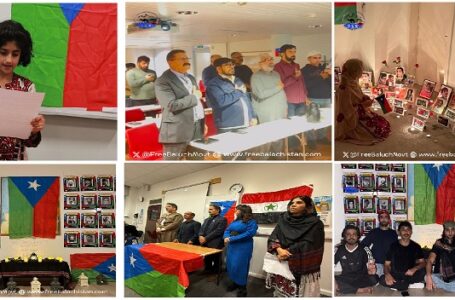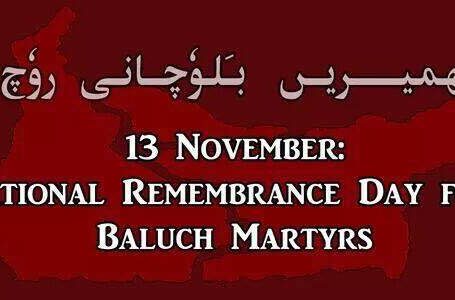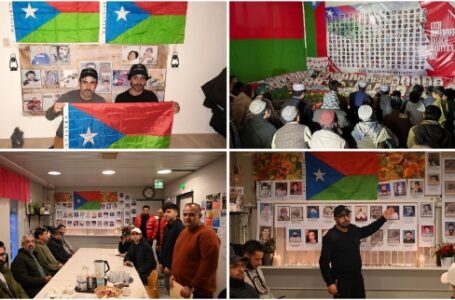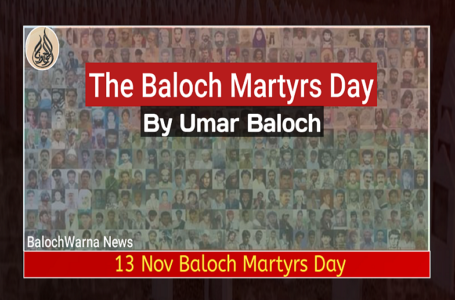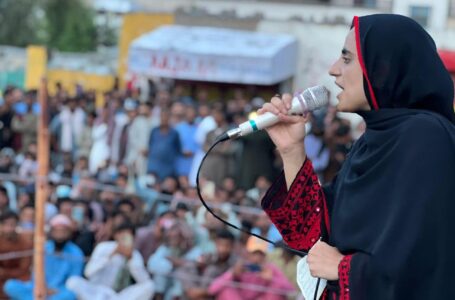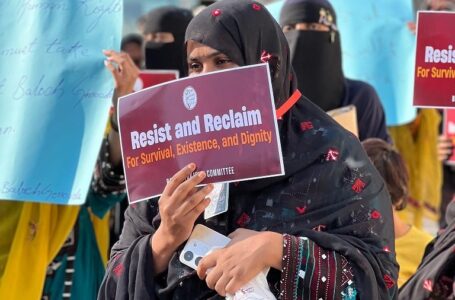FBM Holds Simultaneous Protests Against Pakistan’s Nuclear Tests on Baloch Land
THE LEGACY OF NOVEMBER 13 IN BALOCH HISTORY
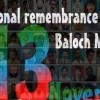
By Shahdad Baloch
The reign of Mehrab Khan was one of a long struggle with his chiefs. He became dependent on men of the stamp of Mullah Muhammad Hassan and Sayyid Muhammad Sharif by whose treachery at beginning of first Afghan war Sir William Macnaghten and sir Alexander Burn were deceived into thinking that Mehrab Khan was a traitor to the British. It was alleged that he had induced the tribes to oppose the advance of British army through the Bolan Pass, and that finally when Sir Alexander Burnes was returning from a mission to Kalat, he had caused a robbery to be committed on the party, during which an agreement, which had been executed between the envoy and the Khan was carried off. This view determined the diversion of Sir Thomas Willshire Brigade from Quetta to attack Kalat in 1839, an act which has been described by Malleson as “MORE THAN A GRAVE ERROR, A CRIME.”
The Baloch palace was taken by assault and Mehran khan was slain on November 13. Today the day is institutionalized through Balochistan Liberation Charter (BLC), as the day for those heroes who sacrificed their lives for the Nobel cause of independence of Balochistan, which says as in Article 70 of BLC:
“The date selected for national remembrance of the heroes of our liberation struggle and their ultimate sacrifice for regaining our independence will be on 13 of November. On this day in 1839 Mir Mehrab Khan and many of his soldiers lost their lives while defending Balochistan against the invading army of British Empire.”
The series of Baloch martyrdoms did not end after 1839 but it was followed by three consecutive popular Anglo-Marri wars. In 1840, Sardar Doda Khan Marri pulled the daggers against Sir John Keane in defence of Kahan against British empire expansionist policies in which victory fell over Doda Khan. In 1880 Marri tribe once again in defence of Balochistan from foreign aggression went in war with Brigadier-General Macgregor, which was then followed by third Angla-Marri war in 1917 under command of General Mir Khuda e Dad Khan Marri. It is reported that thousands of Marri Baloch embraced martyrdom in three Anglo-Marri wars, but because of lack of resources the exact number of casualties was not known but the purport of sacrifices was to preserve and sustain the sovereignty of Balochistan.
On 27 March 1948 Pakistan forcibly occupied and later illegally annexed Balochistan to Pakistan against the will of the Baloch nation. On the night of May 16, 1948, Prince Abdul Karim Khan, in defiance decided to lead a liberation movement against the Pakistan government to force them out from the territory of Balochistan. Due to lack of support from neighbouring nations and international community Prince Abdul Karim was forced to return to Balochistan and peacefully negotiate his demands as Pakistan had sworn on holy Quran to meet his demands. However, 8 July 1948 Prince Abdul Karim along with 142 of his companions were attacked and arrested by the Pakistani army.
The interminable struggle against the occupation of Balochistan by Iran and Pakistan continued with the passage of time followed by another insurgency in 1958 led by Nawab Norouz Khan. The Baloch nation was once again betrayed in the name of holy Quran and assured by Pakistani Army that Baloch nation demand for restoration of independence would be kept under consideration via diplomatic efforts. Nawab Norouz Khan agreed to halt guerrilla campaign thereby resolving the prevailed matter with negotiation but in return, nawab Norouz Khan and his companions arrested and later hanged and in Hyderabad Jail whereas Nawab Norouz Khan spared due to his age, but he embraced martyrdom in prison. That was the second time in the history of the Baloch nation when Pakistan exploited Islam and holy Quran to betray the Baloch nation. Since then the Baloch nation realised that Pakistan is not a credible country in terms of diplomacy and negotiation.
In early 70s Nawab Khair Bakhsh Marri with other Baloch waged a guerrilla warfare against Pakistan with the same notion of freedom of Balochistan. The non-compromising nature of Nawab Khair Bakhsh Marri caused Pakistan army to terrorise the Baloch nation with indiscriminate use of military tanks, fighter jets and other heavy artilleries against the Baloch people. It was reported at that time, that hundreds of Baloch women particularly from Marri tribe were sold in Lahore and elsewhere in Punjab (The evidence of which is available on YouTube where guerrilla commander Sher Mohammad Marri aka general Sherof revealed the bitter truth).
In the late 90s when Pakistani dictator Musharraf took over Pakistan, his first criminal act was to declare war against the Baloch nation. He ordered attacks against Baloch civilians and the murder of innocent men, women and children. It was dictator Musharraf who spearhead the assassination of Nawab Akbar Bugti on 26 August 2006. The Musharraf regime and his successors have committed crimes against humanity and war crimes in Balochistan by indiscriminately bombing Baloch civilian populations, arbitrary arrests and extra-judicial killing of innocent Baloch on regular bases. The Pakistan regimes have turned Balochistan into a no-go zone for local and international in order to conceal their crimes against the Baloch nation.
Brad Adams the director of the Asia branch of HRW has said the human right violation in Balochistan include torture, enforced disappearances of those who are opposing the military, ill-treatment of those suspected of criminal activity, and extrajudicial killings. Marc Tarabella, the vice-chair of the European Parliament’s delegation for relations with the countries of Southeast Asia and the Association of Southeast Asian Nations (ASEAN), has called reports of the human rights situation “alarming” and stated that the “main victims” of the violence are Balochistanis who “are being systematically targeted by paramilitary groups, allegedly sponsored by the Pakistani authorities.” And British journalist Declan Walsh wrote in The Guardian newspaper, “newspaper reports in Pakistan about civilian killings in Balochistan are buried quietly on the inside pages, cloaked in euphemisms or, quite often, not published at all.”
On several occasions, Pakistani authorities claimed that the missing persons are their custody but with the passage of time ‘missing’ have been recovered either killed, dumbed and in mass graves. Yet the actual statistics is unknown due to lack of media coverage and barring international human rights organisation to ferret out the exact casualties and state terrorism.
According to an 8 December 2005 statement, by the then Pakistani interior minister Aftab Sherpao, an estimated 4000 people from Balochistan were in the custody of the authorities having been detained in the province between 2002–2005. However, in early 2011 The Guardian newspaper reported that “several human rights groups, including Amnesty International”, had documents “more than 100 bodies” found dumped in Balochistan, many “mutilated corpses bearing the signs of torture” – “lawyers, students, taxi drivers, farm workers.
In September 2015, the Asian Human Right Commission reported, “The Interior Ministry of Baluchistan has recently stated that it has arrested 8363 Baloch over the span of 9 months. Whereas, the Chief Minister of Balochistan Dr Malik Baloch has said that those arrested will be dealt in accordance with the law.” Afterwards, there have been no reports about the fate of those arrested under so-called National Action Plan (NAP). A Baloch human rights group the International Voice for Baloch Missing Persons claims that 18,000 Baloch were missing by 2014, of whom more than 2,000 were killed.
The matter of grave concern is the growing abduction of Baloch women that has intensified lately. Previously acid was splashed on the faces of Baloch female students and women and many were threatened with dire consequences, then came the practical abduction of Baloch women and children throughout occupied Balochistan. The reason behind it is the silence international community which encourages Pakistan to continue its brutalities and bloodbath in Balochistan. The Pakistani Army, paramilitary forces, coupled with death squads and state-sponsored religious fundamentalists are involved in these crimes.
The British empire at the end endorsed their killing of Baloch in early 18s and called the conduct a ‘Gross crime’. The Portuguese empire on the killing of Hamal Hoth in seventeenth-century nullified their crime by raising a monument of Hammal Hoth at Goa. In fact, both were the ethical enemy of Baloch but what Pakistan and Iran are doing is profoundly unethical and against the law of war. They arrest and disappear people for many years without trying them in any court of law. They killed people in custody and bury them in mass graves. The family of disappeared and murdered people are deprived of their legal rights to visit their loved one or get the dead bodies of those killed in custody.
The pro-freedom Baloch leader and head of Free Balochistan Movement Hyrbyair Marri and his like-minded friends arranged the first ever and largest gathering on Baloch Martyrs Day in London in 2009. Since then every year the Baloch nation observes 13 November as Baloch Martyrs’ Day also known as National Remember Day for Baloch Martyrs to pay tributes to Baloch heroes of their liberation struggle. It is a day to remember all the Martyrs before and after the murder of Mir Mehrab Khan and his companion and to all those who poured their blood in defence of every inch of Balochistan. The day symbolises that all martyrs are equal irrespective of cast, profession, colour or rank and profile.
The political activists of Free Balochistan movement headed by Hyrbyair Marri in coalition with other Baloch political parties and activists held references in Germany, London, Canada, Sweden, Norway and other European countries to commemorate the day for those Baloch who sacrificed their lives without any personal gains and motives but for the freedom of Balochistan. This year also the Freedom Balochistan Movement has announced to organise events abroad and in Balochistan to pay homage to the fallen heroes of the Baloch nation.
All countries and nations have their martyrs’ day with different dates but we Baloch demand that there should be a United Nations approved to date for those who sacrifice their most precious thing – their lives – for the freedom of their homeland and betterment of future generations, who are the real heroes of the world with the slogan that ‘OUR BLOOD IS FOR YOUR FREEDOM!

